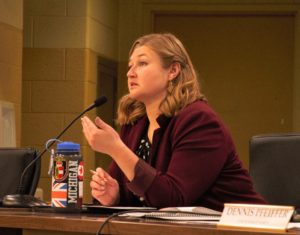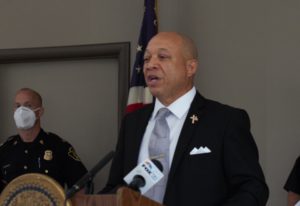By Tom Travis
In a dramatic and unprecedented vote, the city council passed a $64 million budget in its Monday meeting. According to Chief Financial Officer (CFO) Robert Widigan, the budget allocates $64 million for the city’s expenditures and is based on $50.7 million in revenue. Widigan explains the budget will be balanced with a transfer of $14 million from the general fund balance which stands at $22 million.
The resolution to approve the city’s 2022-2023 fiscal year budget passed 5-2. Voting ‘yes’ were Councilpersons Allie Herkenroder (Ward 7), Eva Worthing (Ward 9), Ladel Lewis (Ward 2), Judy Priestley (Ward 4) and Jerri Winfrey-Carter (Ward 5). Councilperson Eric Mays abstained and Tonya Burns voted no. Councilperson Quincy Murphy (Ward 3) had left the meeting earlier in the evening and Councilperson Dennis Pfeiffer was absent.
Councilperson Winfrey-Carter casts final ‘yes’ vote to approve budget
The process to get to 5-2 was dramatic. After six hours of council deliberations (and months of debate), City Clerk Inez Brown began the roll-call vote on the budget resolution. When she called for Councilperson Jerri Winfrey-Carter’s (Ward 5) vote there was an unusually long pause. Councilpersons looked at Winfrey-Carter.

Councilperson Jerri Winfrey-Carter (Ward 5) cast the deciding vote to approve the city’s $64 million budget. (Photo by Tom Travis)
The pause lasted nearly 30 seconds.
Finally, Winfrey-Carter leaned forward into her microphone and said, “yes.”
Her vote gave the necessary fifth affirmative to pass the budget. Councilperson Eric Mays mumbled into his microphone, “unbelievable” as Winfrey-Carter cast her vote.
EVM has reached out to Winfrey-Carter for her thoughts on the vote. At the time of publishing she has not responded.
Throughout the budget hearings and budget debates in council meetings, Winfrey-Carter has largely sided with Mays in their contentiousness towards the Mayor’s budget.
In a phone interview early Tuesday morning, Council Vice-President Allie Herkenroder agreed it was a dramatic moment in council voting. Herkenroder said she was very happy with Winfrey-Carter’s yes vote. “The vote was very telling about the council.
“I see her vote as her putting Flint first,” Herkenroder said. “Each vote carries so much weight.”

Councilperson Vice President Allie Herkenroder (Ward 7). (Photo by Tom Travis)
Herkenroder added she’s excited about the city. “The city is beginning to move forward,” she declared.
In a Tuesday morning follow-up email, the city’s chief financial officer, Robert Widigan, stated, “The city is still in the black. The Mayor’s proposed budget passed by the City Council last night is a balanced budget. This budget uses some of the General Fund Balance to maintain city services for our residents…there is no deficit for 2023. ”
According to Public Act 2 of 1968 local governments are prohibited to have deficit spending.
Widigan added, “However, if pension costs continue to rise as forecasted in FY2024, the city is projected to see a deficit of $15 million.”
Mayor Sheldon Neeley wrote in his submitted budget to council, “Today, for FY2022 and FY2023, the pension contribution remains about $32 million and is projected to increase to $40 million in FY2024.
Mayor Sheldon Neeley. (Photo by Tom Travis)
“This drastic increase makes pension contributions our most significant expense in the city budget. The outcome of these challenges is that the City of Flint faces an ongoing structural General Fund budget deficit of a $14 million reduction to fund balance in FY2023.
“This continues to grow to a $20 million reduction to fund balance in FY2024. In FY2023, we address this structural deficit with the use of some one‐time fixes available to use due to poor accounting practices from the past. However, this does not fix the overall problem, and in FY2024, we are still projecting a significant deficit in the General Fund.
“The state of Michigan, its EMs, and the RTAB Board failed the residents of Flint. Those failures resulted in these ongoing structural budget deficits. This administration will seek a better path forward as we strive to build a partnership with the Flint City Council and the residents of Flint.
“On March 1, 2022, the Michigan House of Representatives passed HB 5054 that would provide $1.15B in state general fund resources to be utilized for direct assistance to municipalities to help pay down municipal pension debt. There will be two parts to the grant program: $900M will be used to bring all pensions that are less than 60% funded up to 60% funded, and $250M will be provided to pensions that are 60% funded or greater.
“This administration will continue to monitor proposed legislation and work with our partners in Lansing to ensure the result provides an affordable path forward for the City to pay pension benefits to retirees.”
Council rejects 10 amendments: community requests, ARP fund movements rejected
Several community requests bore the brunt of the council’s final decisions. On the agenda was a resolution with 10 amendments from city council. Over the past few weeks the council had met as the Finance Committee, chaired by Councilperson Tonya Burns (Ward 6).
During those meetings the council drafted the amendments which included an increase to the Ombudsperson’s budget of $300,000, a decrease of $168,428 for Supplies and Operations, an increase of $25,000 for Hasselbring Community Center (Ward 1), increase of $25,000 for Brennan Community Center (Ward 7), increase of $50,000 for Haskell Community Center, an increase of $8.1 million Budget Transfers from ARP (American Rescue Plan – Federal Stimulus), an increase of $40,000 for Major Street Fund/Tree Removal services, an increase in $60,000 for Local Street Fund/Tree Removal services, an increase in $140,000 for Major Street Fund Personnel Services, and an increase of $210,000 for Local Street Fund Personnel Services. These amendments were voted down.
After the resolution with amendments was voted down, the original resolution was brought for a vote. The original resolution was the budget the Mayor’s office submitted for approval.
The link to the proposed budget can be viewed here.
EVM Managing Editor Tom Travis can be reached at tomntravis@gmail.com.



You must be logged in to post a comment.